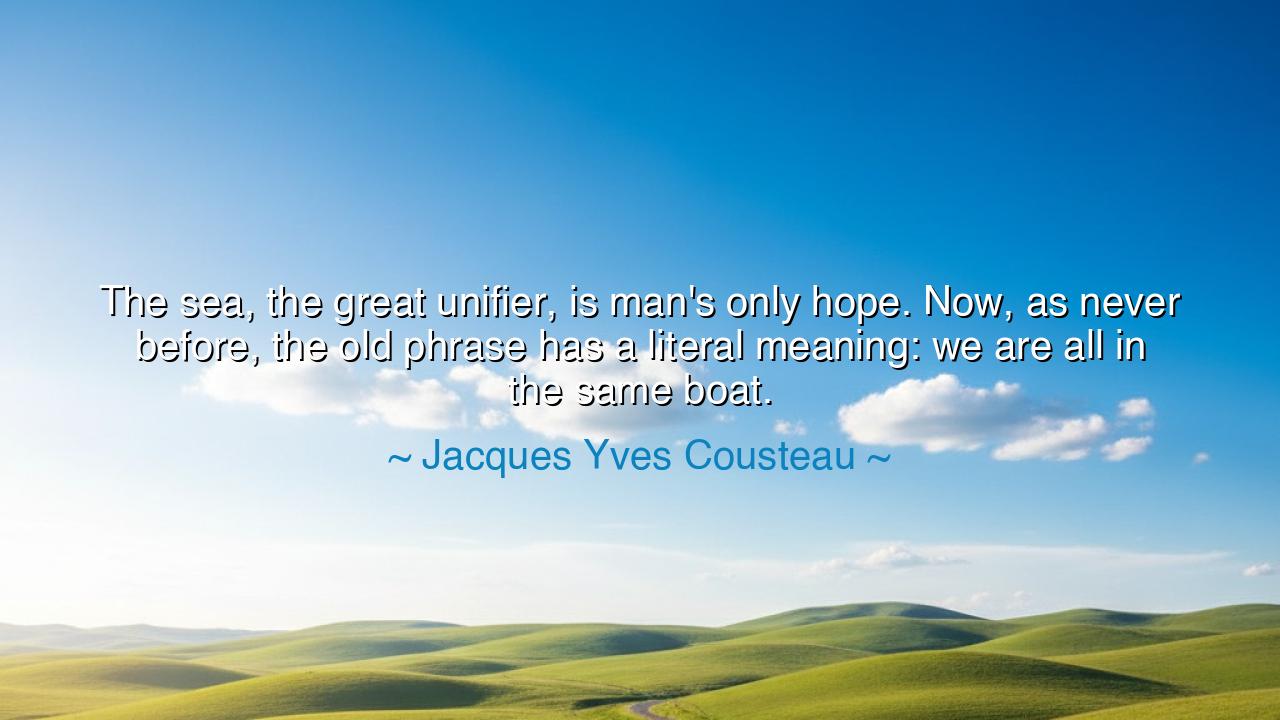
The sea, the great unifier, is man's only hope. Now, as never
The sea, the great unifier, is man's only hope. Now, as never before, the old phrase has a literal meaning: we are all in the same boat.






The words “The sea, the great unifier, is man’s only hope. Now, as never before, the old phrase has a literal meaning: we are all in the same boat,” spoken by Jacques Yves Cousteau, rise like a tide of truth that washes over the conscience of humanity. Beneath their calm surface lies a vast and urgent message — that the fate of humankind is bound together by the same waters that cradle the Earth. The sea, that eternal mirror of the heavens, is not only a body of water; it is the lifeblood of the planet, the silent keeper of balance, and the final witness to our unity or our destruction. Cousteau, who spent his life exploring its mysteries, did not speak as a poet alone, but as a prophet — warning that the ocean which unites us also reflects our shared destiny.
When Cousteau calls the sea the “great unifier,” he reminds us that all life springs from the same deep source. Before there were nations, before there were names, there was the sea — vast, indifferent, and nurturing. From its salt womb arose the first living forms, and in its rhythm the heartbeat of the Earth still echoes. No wall, no border, no ideology can divide the waters that wrap around every shore. The sea touches every continent, every people, every soul. Thus, in its embrace, humanity is one — children of the same tide, breathing the same air, sustained by the same cycle of creation.
Yet Cousteau’s words are not merely poetic reverence — they are a cry of warning. When he says “man’s only hope,” he speaks not of the sea as a savior in myth, but as the living system that sustains all life. The oceans govern the climate, feed billions, and generate most of the oxygen we breathe. But they are also fragile, wounded by human greed and indifference — poisoned by plastic, stripped of life, and heated by our own hands. Cousteau foresaw that if the sea dies, so too will the land, for one cannot survive without the other. In his time, he saw the first signs of decay; in ours, we see the fulfillment of his fears. His warning now bears the weight of prophecy: to destroy the sea is to destroy ourselves.
The phrase “we are all in the same boat” carries both irony and wisdom. Once, it was a saying about shared risk; now, Cousteau declares, it is literal truth. Our planet, this blue vessel adrift in the darkness of space, is that boat — fragile, finite, and surrounded by an endless sea of stars. Just as sailors on a ship must work together to survive, so too must humanity act with unity and foresight, for no one escapes the storm alone. Whether one is rich or poor, powerful or weak, the rising tide will reach every shore. The poison we pour into the waters will return in the rain. The waste we throw into the ocean will one day fill the fish we eat. There is no "elsewhere" to cast our sins; all returns to the same sea.
History offers countless reminders of this truth. In the aftermath of the Second World War, the nations of the Earth faced a reckoning: they had split the world apart with greed and hatred, and now they had to learn to rebuild together. The ashes of war gave birth to the United Nations, an attempt — however imperfect — to acknowledge that the world’s fate was shared. It was in that same century that Cousteau took his ship, the Calypso, across the oceans, showing through film and science that the ocean was not many seas, but one — one body, one breath, one life. Just as the world’s nations were learning that war on one continent would bring ruin to all, Cousteau taught that pollution in one sea would poison the globe. In this way, his message was not only about water, but about wisdom, cooperation, and survival.
And yet, Cousteau’s quote is not without hope. For just as the sea binds us in danger, it can also unite us in renewal. He saw in the ocean not only warning, but redemption — the power of the natural world to heal if only we give it the chance. When the fisherman learns to take less, when the child learns to cherish the coral, when the nations agree to protect rather than plunder, the sea answers with abundance. Respect, he teaches us, is the first act of salvation. To respect the ocean is to respect life itself, and to understand that man is not the master of nature, but her steward and her son.
So let this be the lesson passed down to all who hear his words: remember the sea. When you gaze upon it, do not see division, but connection. When you walk its shores, remember that its waves have touched every corner of the Earth. When you think of the future, know that your choices ripple through its depths. We are, each of us, sailors aboard the same vessel — and if we would survive the storms to come, we must row together. For as Cousteau taught, the sea is not only the great unifier of the world; it is the mirror of our soul. When we honor it, we honor ourselves. When we destroy it, we sink as one. And when we learn to protect it — then, and only then — will we finally deserve to call ourselves the children of the sea.






AAdministratorAdministrator
Welcome, honored guests. Please leave a comment, we will respond soon